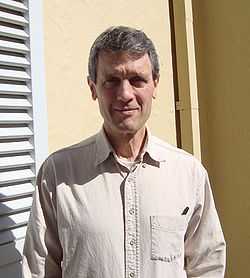Roger Evans Howe

Roger Evans Howe is Professor of Mathematics at Yale University. He is well known for his contributions to representation theory, and in particular for the notion of a reductive dual pair, sometimes known as a Howe pair, and the Howe correspondence.
Biography
He attended Ithaca High School, then Harvard University as an undergraduate, winning the William Lowell Putnam Mathematical Competition in 1964. He obtained his Ph.D. from University of California, Berkeley in 1969. His thesis, titled On representations of nilpotent groups, was written under the supervision of Calvin Moore. He has been a Yale faculty member since 1974.
He has been a member of the National Academy of Sciences since 1994. He is also a member of the American Academy of Arts and Sciences.
Howe received a Lester R. Ford Award in 1984.[1] In 2006 he was awarded the American Mathematical Society Award for Distinguished Public Service in recognition of his "multifaceted contributions to mathematics and to mathematics education."[2] In 2012 he became a fellow of the American Mathematical Society.[3]
Selected Works
- Howe, Roger; De Myttenaere-Bursztein, S; Maxwell, MH; De Lima, J (1979), "On the tendency toward convexity of the vector sum of sets|", Kidney international, Cowles Foundation discussion papers (Cowles Foundation for Research in Economics, Yale University) 538 (5): 325–33, RePEc:cwl:cwldpp:538 (Shapley–Folkman lemma on Minkowski addition of non-convex sets)
- Howe, Roger (1989), "Remarks on classical invariant theory", Transactions of the American Mathematical Society 313 (2): 539–570, doi:10.2307/2001418, ISSN 0002-9947, JSTOR 2001418, MR 0986027
- Howe, Roger; Umeda, Toru (1991), "The Capelli identity, the double commutant theorem, and multiplicity-free actions", Mathematische Annalen 290 (1): 565–619, doi:10.1007/BF01459261
- Roger Howe & William Barker (2007) Continuous Symmetry: From Euclid to Klein, American Mathematical Society, ISBN 978-0-8218-3900-3 .
- Robin Hartshorne (2011) Review of Continuous Symmetry, American Mathematical Monthly 118:565–8.
See also
- Oscillator semigroup
References
- ↑ Howe, Roger (1983). "Very basic Lie theory". Amer. Math. Monthly 90: 600–623. doi:10.2307/2323277.
- ↑ Roger Howe Receives 2006 AMS Award for Distinguished Public Service
- ↑ List of Fellows of the American Mathematical Society, retrieved 2013-01-21.
External links
|